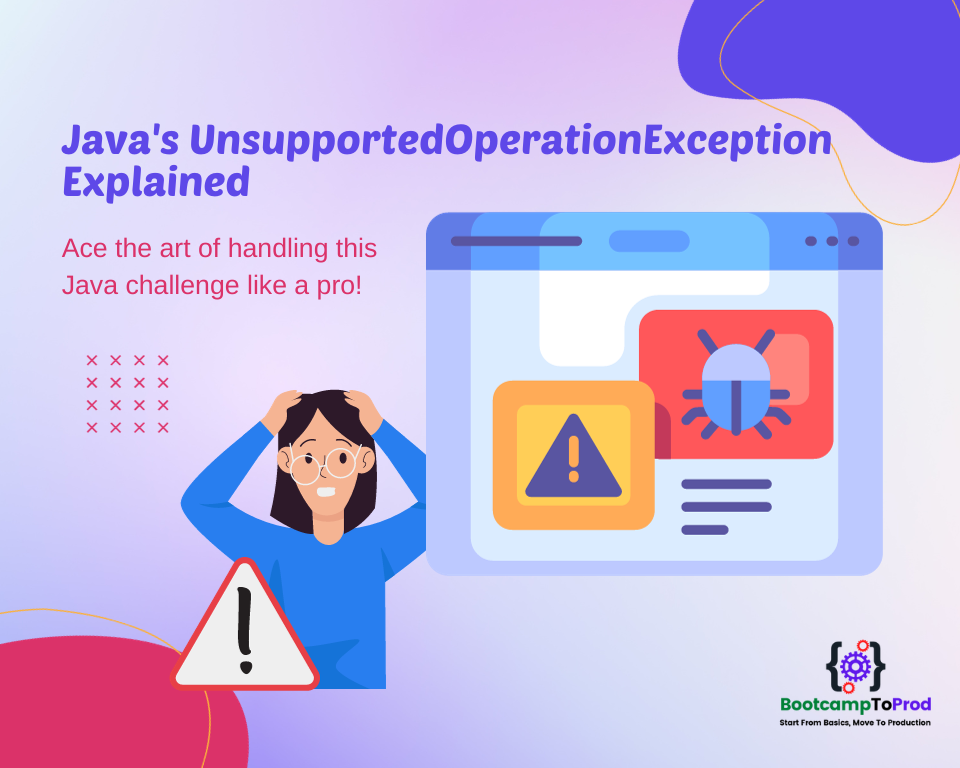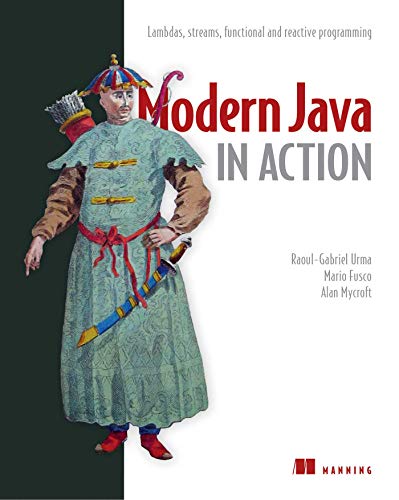Discover causes, prevention, and fixes for Java’s UnsupportedOperationException. Learn to navigate this issue efficiently in your code.
Introduction
Java is a popular programming language that offers many features and benefits for developers. However, like any other programming language, Java also has some limitations and challenges that you may encounter while coding. One of these challenges is the UnsupportedOperationException.
The UnsupportedOperationException is a type of runtime exception that occurs when you try to perform an operation on a collection or an array that does not support it. For example, if you try to add or remove an element from an unmodifiable collection, or if you try to modify an array that was created from a fixed-size list, you will get an UnsupportedOperationException.
In this blog post, we will explain what causes the UnsupportedOperationException, how to avoid it, and how to handle it if it occurs.
What causes the UnsupportedOperationException?
The UnsupportedOperationException is thrown by some methods of the java.util.Collections class, the java.util.Arrays class, and some other classes that implement the java.util.Collection interface or the java.util.List interface. These methods are usually marked as optional in the documentation, which means that they are not required to be implemented by the classes that use them.
Some of the common methods that may throw the UnsupportedOperationException are:
- add(E e): Adds an element to the end of a list or a collection.
- addAll(Collection<? extends E> c): Adds all the elements of a collection to the end of a list or a collection.
- remove(Object o): Removes an element from a list or a collection.
- removeAll(Collection<?> c): Removes all the elements of a collection from a list or a collection.
- retainAll(Collection<?> c): Retains only the elements of a collection that are also in a list or a collection.
- clear(): Removes all the elements from a list or a collection.
- set(int index, E element): Replaces the element at a specified index in a list with a new element.
These methods may throw the UnsupportedOperationException if the collection or the list that they are applied to is immutable, unmodifiable, or fixed-size. An immutable collection or list is one that cannot be changed after it is created. An unmodifiable collection or list is one that is wrapped by a method that prevents any modification. A fixed-size collection or list is one that is backed by an array that cannot be resized.
Some of the common ways to create such collections or lists are:
- Using the Collections.unmodifiableCollection(Collection<? extends T> c), Collections.unmodifiableList(List<? extends T> list), or similar methods of the Collections class. These methods return a view of the original collection or list that cannot be modified.
- Using the Arrays.asList(T… a) method of the Arrays class. This method returns a fixed-size list that is backed by the specified array. Any changes to the array will be reflected in the list, and vice versa. However, the size of the list cannot be changed, and any attempt to do so will result in an UnsupportedOperationException.
- Using the List.of(E… elements), Set.of(E… elements), or Map.of(K… keys, V… values) methods of the Java 9 or later versions. These methods return immutable collections or lists that contain the specified elements. Any attempt to modify them will result in an UnsupportedOperationException.
How to avoid the UnsupportedOperationException?
The best way to avoid the UnsupportedOperationException is to check the documentation of the methods that you are using, and see if they are optional or not. If they are optional, you should also check the type of the collection or the list that you are using, and see if it supports the operation or not. If it does not support the operation, you should either use a different type of collection or list, or use a different method that does not throw the exception.
For example, if you want to add an element to a list, you should avoid using the Arrays.asList method, as it returns a fixed-size list that does not support the add method. Instead, you can use the ArrayList class, which implements the List interface and supports the add method. Alternatively, you can use the Collections.addAll method, which adds all the elements of an array or a collection to a list or a collection, without throwing the exception.
Another way to avoid the UnsupportedOperationException is to catch it and handle it appropriately. This is useful when you are not sure if the collection or the list that you are using supports the operation or not, or when you are using a third-party library that may throw the exception. To catch the exception, you can use a try-catch block, and provide a suitable action or message in the catch clause.
For example, if you want to remove an element from a list, you can use a try-catch block to catch the UnsupportedOperationException, and display a message to the user that the operation is not supported.
Examples
Here are some examples of code that may cause the UnsupportedOperationException, and how to fix them.
Example 1: Adding an element to a fixed-size list
// Create an array of strings
String[] names = {"Alice", "Bob", "Charlie"};
// Create a fixed-size list from the array
List<String> nameList = Arrays.asList(names);
// Try to add an element to the list
nameList.add("David"); // This will throw an UnsupportedOperationException
To fix this, consider using an ArrayList instead of using the Arrays.asList method to enable List modification. Alternatively, you can utilize the Collections.addAll method for adding elements.
// Create an array of strings
String[] names = {"Alice", "Bob", "Charlie"};
// Create a mutable list from the array
List<String> nameList = new ArrayList<>(Arrays.asList(names));
// Add an element to the list
nameList.add("David"); // This will work
Or
// Create an array of strings
String[] names = {"Alice", "Bob", "Charlie"};
// Create a fixed-size list from the array
List<String> nameList = Arrays.asList(names);
// Create another array of strings
String[] moreNames = {"David", "Eve", "Frank"};
// Add all the elements of the second array to the list
Collections.addAll(nameList, moreNames); // This will work
Example 2: Removing an element from an unmodifiable collection
// Create a set of integers
Set<Integer> numbers = new HashSet<>();
// Add some elements to the set
numbers.add(1);
numbers.add(2);
numbers.add(3);
// Create an unmodifiable view of the set
Set<Integer> unmodifiableNumbers = Collections.unmodifiableSet(numbers);
// Try to remove an element from the unmodifiable set
unmodifiableNumbers.remove(1); // This will throw an UnsupportedOperationException
To address the issue, prefer using the original mutable set instead of an unmodifiable view. Alternatively, utilize the Iterator.remove method for removal operations.
// Create a set of integers
Set<Integer> numbers = new HashSet<>();
// Add some elements to the set
numbers.add(1);
numbers.add(2);
numbers.add(3);
// Remove an element from the original set
numbers.remove(1); // This will work
Or
// Create a set of integers
Set<Integer> numbers = new HashSet<>();
// Add some elements to the set
numbers.add(1);
numbers.add(2);
numbers.add(3);
// Create an unmodifiable view of the set
Set<Integer> unmodifiableNumbers = Collections.unmodifiableSet(numbers);
// Create an iterator for the unmodifiable set
Iterator<Integer> iterator = unmodifiableNumbers.iterator();
// Loop through the elements of the unmodifiable set
while (iterator.hasNext()) {
// Get the next element
Integer number = iterator.next();
// Check if the element is equal to 1
if (number.equals(1)) {
// Remove the element using the iterator
iterator.remove(); // This will work
}
}
Example 3: Replacing an element in an immutable list
// Create an immutable list of strings
List<String> colors = List.of("red", "green", "blue");
// Try to replace an element in the list
colors.set(0, "yellow"); // This will throw an UnsupportedOperationException
To fix this, consider using a mutable list instead of an immutable one, like List.of, to allow modifications. Alternatively, utilize the Stream.map method to modify elements effectively.
// Create a mutable list of strings
List<String> colors = new ArrayList<>(List.of("red", "green", "blue"));
// Replace an element in the list
colors.set(0, "yellow"); // This will work
Or
// Create an immutable list of strings
List<String> colors = List.of("red", "green", "blue");
// Create a stream from the list
Stream<String> colorStream = colors.stream();
// Map each element to a new value
Stream<String> newColorStream = colorStream.map(color -> {
// Check if the element is equal to "red"
if (color.equals("red")) {
// Return "yellow" instead of "red"
return "yellow";
} else {
// Return the original element
return color;
}
});
// Collect the stream into a new list
List<String> newColors = newColorStream.collect(Collectors.toList());
Things to Consider
Here are some things to consider when dealing with the UnsupportedOperationException:
- Collection Documentation Check: Understand which operations are supported by different collections by reviewing their respective documentation.
- Error Handling Techniques: Implement suitable error handling strategies to catch and manage UnsupportedOperationExceptions.
- Mutability Understanding: Differentiate between mutable and immutable collections to avoid unsupported modifications.
- Thorough Testing Approach: Conduct comprehensive testing, exploring diverse scenarios where unsupported operations might occur.
- Preventive Measures Adoption: Use preventive measures like creating copies of immutable collections for modifications to avert unsupported actions.
- Continuous Learning and Adaptation: Stay updated with Java’s collection behaviors and adapt your coding practices based on continuous learning and experiences.
FAQs
What is UnsupportedOperationException in Java?
UnsupportedOperationException in Java is a runtime exception thrown to indicate that the requested operation is not supported, often occurring when attempting to modify an immutable or restricted collection.
What causes UnsupportedOperationException in Java?
This exception arises primarily due to attempts to modify immutable collections or when executing operations not supported by specific collections, like adding or removing elements from fixed-size lists.
How can I handle UnsupportedOperationException?
Handling this exception involves using mutable collections for modifications, or creating copies of immutable collections before attempting modifications and performing operations on newly created immutable collections.
Which Java operations commonly trigger UnsupportedOperationException?
Operations like attempting to modify immutable collections, adding/removing elements from fixed-size lists, or executing unsupported operations on read-only collections often lead to this exception.
Conclusion
In this blog post, we have learned what the UnsupportedOperationException is, what causes it, how to avoid it, and how to handle it if it occurs. Understanding collection behaviors, employing proper error handling, and differentiating between mutable and immutable collections are key to minimizing UnsupportedOperationException instances.
Learn More
Interested in learning more?
Check out our blog on Java String isEmpty() vs isBlank() methods
Top Picks for Learning Java
Explore the recommended Java books tailored for learners at different levels, from beginners to advanced programmers.
Disclaimer: The products featured or recommended on this site are affiliated. If you purchase these products through the provided links, I may earn a commission at no additional cost to you.
- All Levels Covered: Designed for novice, intermediate, and professional programmers alike
- Accessible Source Code: Source code for all examples and projects are available for download
- Clear Writing Style: Written in the clear, uncompromising style Herb Schildt is famous for
Head First Java: A Brain-Friendly Guide
- Engaging Learning: It uses a fun approach to teach Java and object-oriented programming.
- Comprehensive Content: Covers Java's basics and advanced topics like lambdas and GUIs.
- Interactive Learning: The book's visuals and engaging style make learning Java more enjoyable.
Modern Java in Action: Lambdas, streams, functional and reactive programming
- Latest Java Features: Explores modern Java functionalities from version 8 and beyond, like streams, modules, and concurrency.
- Real-world Applications: Demonstrates how to use these new features practically, enhancing understanding and coding skills.
- Developer-Friendly: Tailored for Java developers already familiar with core Java, making it accessible for advancing their expertise.
- Java Essentials: Learn fundamental Java programming through easy tutorials and practical tips in the latest edition of the For Dummies series.
- Programming Basics: Gain control over program flow, master classes, objects, and methods, and explore functional programming features.
- Updated Coverage: Covers Java 17, the latest long-term support release, including the new 'switch' statement syntax, making it perfect for beginners or those wanting to brush up their skills.






Add a Comment